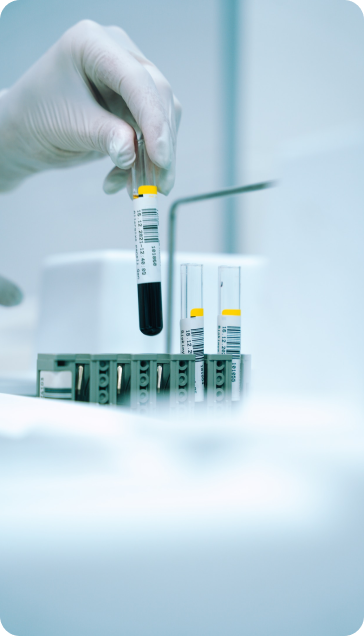List of Included Tests - 18 Tests
A complete blood count (CBC) is a blood test used to evaluate your overall health and detect a wide range of disorders, including anemia, infection, platelets disorders and leukemia.
Glycated Haemoglobin (HbA1c) is a blood test that is used to help diagnose and monitor people with diabetes. It measures the amount of blood sugar (glucose) attached to your hemoglobin. It shows your average blood sugar level over the past 2 or 3 months.The higher the hemoglobin A1c, the higher your risk of having complications related to diabetes.
This test is done to measure the amount of Alanine Aminotransferase (ALT) in blood serum. ALT is an enzyme found mostly in the liver. This test is prefered to be done on a regular basis to assure liver is in a healthy state
Triglycerides are insoluble lipid in the blood ,present in dietary fat ,synthesised by the liver and stored in adipose tissue.Elevated levels of TG may be associated with risk of cronary artery disease and acute pancreatitis.
LDL cholesterol is considered the “bad” cholesterol, because it contributes to fatty buildups in arteries (atherosclerosis). This narrows the arteries and increases the risk for heart attack, stroke and peripheral artery disease (PAD).
Non-HDL cholesterol evaluates your high-density lipoprotein (HDL, or “good”) cholesterol number from your total cholesterol number. So it contains all the “bad” types of cholesterol.Higher values mean a higher risk of heart disease.
This test measures how well your kidneys are performing their job of filtering waste from your blood. Creatinine is a chemical compound left over from energy-producing processes in your muscles. Healthy kidneys filter creatinine out of the blood. Creatinine exits your body as a waste product in urine
A hormone secreted from the pituitary gland, which is located just below the brain, and then released into the bloodstream. This hormone performs two different functions: In both women and men, in men, the hormone helps control the production of sperm, and its quantity in men is usually fixed, while in women it controls the menstrual cycle and the production of eggs from the ovaries.
This test measures the level of the total testosterone hormone in the blood. Testosterone is a male sex hormone that helps in developing musculine features. Adrenal gland is the main source of testosterone. This hormon naturally present in both male and female with different level .
BMI is a person’s weight in kilograms (or pounds) divided by the square of height in
meters (or feet). A high BMI can indicate high body fatness. BMI screens for weight categories that may lead to health problems, but it does not diagnose the body fatness or health of an individual.
TSH is a hormone secreted by the anterior pituitary gland it can asees the thyroid function and monitor thyroid hormone replacement theraby.it is low in primary hyperthyrodisim and high in primary hypothyrodisim.
Cholesterol is a waxy substance found in your blood. Your body needs cholesterol to build healthy cells, but high levels of cholesterol can increase your risk of heart disease.
This ratio compares your total-cholesterol-to-HDL ratio. It helps figure out your risk for coronary heart disease and stroke. The American Heart Association recommends that all adults older than 20 have a lipid profile once every 4 to 6 years as long as your risk for cardiovascular disease stays low.
This test measures the amount of nitrogen in your blood that comes from the waste product urea. A small amount of urea nitrogen in your blood is normal. If you have too much urea nitrogen in your blood, your kidneys aren’t filtering it properly. You may have a condition that’s affecting your kidneys’ health. A BUN test is done to see how well your kidneys are working.
This test is useful for measuring LH (Luteinizing Hormone) in samples of urine or blood. In females, LH is necessary for regulation of their menstrual cycle along with egg production, while in men it stimulates testosterone production, thus playing a vital role in production of sperms.
This test measures the level of the free form of testosterone hormone (non protien bind ) in the blood. Testosterone is a male sex hormone that helps in developing musculine features. Adrenal gland is the main source of testosterone. This hormon naturally present in both male and female with different level .
A prolactin (PRL) test measures the level of prolactin in the blood. Prolactin is a hormone made by the pituitary gland, a small gland at the base of the brain. Prolactin causes the breasts to grow and make milk during pregnancy and after birth. Prolactin levels are normally high for pregnant women and new mothers.
Preparation
- Fasting from 10 to 12 hours is required




